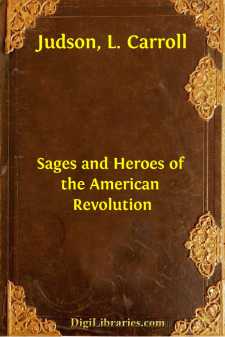Categories
- Antiques & Collectibles 13
- Architecture 36
- Art 48
- Bibles 22
- Biography & Autobiography 813
- Body, Mind & Spirit 142
- Business & Economics 28
- Children's Books 14
- Children's Fiction 11
- Computers 4
- Cooking 94
- Crafts & Hobbies 4
- Drama 346
- Education 46
- Family & Relationships 57
- Fiction 11829
- Games 19
- Gardening 17
- Health & Fitness 34
- History 1377
- House & Home 1
- Humor 147
- Juvenile Fiction 1873
- Juvenile Nonfiction 202
- Language Arts & Disciplines 88
- Law 16
- Literary Collections 686
- Literary Criticism 179
- Mathematics 13
- Medical 41
- Music 40
- Nature 179
- Non-Classifiable 1768
- Performing Arts 7
- Periodicals 1453
- Philosophy 64
- Photography 2
- Poetry 896
- Political Science 203
- Psychology 42
- Reference 154
- Religion 513
- Science 126
- Self-Help 84
- Social Science 81
- Sports & Recreation 34
- Study Aids 3
- Technology & Engineering 59
- Transportation 23
- Travel 463
- True Crime 29
Sages and Heroes of the American Revolution
Description:
Excerpt
The history of men should interest every reader. It is the mirror of mind—imparting lessons of thrilling interest, essential improvement, exquisite pleasure—substantial advantage. It is a matter of deep concern to the investigating student. Remoteness increases veneration. Human foibles are buried in the tomb. Faults are often eclipsed by towering virtues—find no place on the historic page and after generations gaze upon a picture of rare perfection, which, as time advances, assumes shades—richer and holier—until it commands the reverence of every beholder. The names of many of the ancients, whose crowning glory was virtue, over whose ashes centuries have rolled, are often referred to with as profound respect as if angel purity had given the impress of Divinity to their every action. A country—a nation may be lost in the whirlpool of revolution—the fame of good and great men is enduring as time. In the persons of the Sages and Heroes of the American Revolution, ancient and modern wisdom, patriotism and courage were combined. Let us join the admiring millions who are gazing on their bright picture and impartially trace the character of those who pledged their lives, fortunes and sacred honors in behalf of FREEDOM.
Among them, John Adams was conspicuous. He was a native of Quincy, Mass. born on the 19th of Oct. (O.S.) 1735. He was the fourth in descent from Henry Adams, who removed from Devonshire Eng. with eight sons and located near Mount Wollaston.
During his childhood he was under the instruction of Mr. Marsh of Braintree and made rapid progress in his education. At the age of sixteen he entered Harvard college at Cambridge and graduated at the age of twenty-one with high honors.
At Worcester he commenced the study of law under Mr. Putnam, finished with Mr. Gridley, supporting himself by teaching a grammar class. Wisdom to discern the path of rigid virtue and uncompromising justice, with moral courage to act, marked his career from the dawn of manhood. He boldly grasped the past, present and future and made deductions truly prophetic. On the 12th of Oct. 1755, he wrote the following paragraph in a letter.
"Soon after the reformation, a few people came over into this new world for conscience sake. Perhaps this apparently trivial incident may transfer the great seat of empire into America. It looks likely to me, if we can remove the turbulent Gallics, our people, according to the exactest computation, will, in another century, become more numerous than England herself. Should this be the case, since we have, I may say, all the naval stores of the nation in our hands, it will be easy to obtain the mastery of the seas and then the united force of all Europe will not be able to subdue us. The only way to keep us from setting up for ourselves, is—to disunite us. Keep us in distinct colonies and then some men in each colony, desiring the monarchy of the whole, will destroy each other's influence and keep the country in equilibrio."
Mark two things referred to in this letter. He plainly saw that the navy is our right arm of defence and yet treated, by our government, with a parsimony that has long astonished the old world. "To disunite us"—the only thing that can ruin us now that we have set up for ourselves. Lay this to heart ye demagogues who are sowing broadcast the seeds of disunion and no longer court a monarchy.
At the end of three years study Mr. Adams was admitted to the practice of law and commenced a successful professional career at Braintree. Constitutional law had become a subject of investigation. Disputes had commenced between the people and the officers of the crown who were employed in the custom-house and claimed the right to search private dwellings for the pretended purpose of discovering dutiable goods. This preliminary act of usurpation was frequently prompted by personal animosity without a shadow of evidence to raise even suspicion. The right of search was vigorously resisted. Writs of assistance were issued—the seeds of the revolution were sown. Mr. Gridley, the friend and admirer of Mr. Adams, defended the officers—not on constitutional ground but from the necessity of the case to protect the revenue, from which Mr. Adams strongly dissented....


